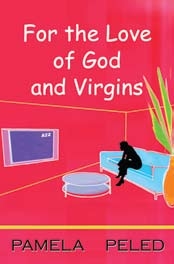For the Love of God and Virgins
FOR THE LOVE OF GOD AND VIRGINS
by Pamela Peled
Miriam's Legacy Publishings, 2010
Reviewed by Carol Novis
The book can be ordered through ESRA for NIS 68 of which NIS 18 is a direct donation to ESRA. To order your copy call 09 956 5728 or email This email address is being protected from spambots. You need JavaScript enabled to view it.
Pamela Peled, whom ESRA members will know as an active volunteer writer for the magazine and a member of the editorial board, has written a spirited novel with a number of themes. Its main focus is the second-time-around love story of two people whose similarities – particularly their shared experience of losing a spouse in a terror attack – manage to overcome their differences. But alongside the love element, Peled has interwoven strands that illuminate, inter alia, what it's like to live in Israel, what South African apartheid was like (and why she is convinced Israel isn't an apartheid state), how some clueless Americans, who have no idea what Israel is like, react comically to the Israeli reality, and above all, how, as she sees, it, Israel is misunderstood by the world – particularly by the world's media. At the book's heart is Peled's passionate belief in Israel's case.
These are themes that clearly have some personal resonance. Like her heroine, Jennifer Moran, Peled is a former South African who came to Israel as a 17-year-old, studied at the Hebrew University, became a teacher and adores Shakespeare. She also knows very well what it is like to lose someone dear to her: her former roommate, Eli Meron, was murdered by terrorists in Sinai and she has dedicated the book to him.
Peled has a fine eye for telling detail; beginning with her description of student life in Jerusalem in the '70s (can there really have been a time when student parking lots were all but empty?). Those of us who were around then will smile at the recollections – goats grazing between buildings, asimonim phone coins, sunflower seeds spit on the floor in old-style cinemas with wooden seats.
Anecdotes too are telling, particularly those that show how near to the surface is knee-jerk animosity towards Israel. At one point, Jennifer is playing computer bridge with an anonymous partner. He plays badly; she points out his mistaken bid. His reaction: "Typical Israeli!" (I would be willing to bet that anecdote was taken from life.) In another incident, English actress Susanna York puts on a one-man show in Israel and dedicates it to, of all people, Mordechai Vanunu. Jennifer goes backstage and gives her hell, to little effect. "A person has to do what a person has to do," is York's response.
The plot concerns Jennifer's life over a period of several decades, with Israel's various tribulations in the background, told with humor and emotional depth. After her husband Eli is killed, leaving her with a daughter, Jennifer withdraws from emotional involvement. Then the Intifada breaks out and a British journalist, David Saunders, reports on the action from the King David Hotel. His reference to the "cycle of violence" with its inference that the death and destruction spread by suicide bombers is balanced by the Israeli response so infuriates her that she is stirred out of her apathy to head for the hotel to confront him – and bursts into tears. This strikes a chord, since Saunders lost his wife in the Twin Towers disaster. There follow the ups and downs of a developing relationship culminating in marriage. Peled is particularly good at describing women's vulnerabilities and strengths in a way that most of us can identify with.
The couple settles in Jerusalem with their combined families and begins writing a book which is intended to tell the world about biased media coverage of Israel. The first chapter is published and unleashes a flurry of antagonism, which results in – well, I won't reveal the climax.
If the book has, perhaps, a difficulty, it is that Peled's passionate defense of Israel's position and her abhorrence of the world's bias, while admirable, leads her to a black and white viewpoint. It might have been strengthened by an acknowledgement that Israel also is not perfect, and that sometimes critical reporting, when true, can have a beneficial effect.
"For the Love of God and Virgins" begins and ends with references to Shakespeare.
Why? In part, of course, because Peled knows well the works of that great author, whose genius spans centuries and civilizations, but also because Shakespeare himself, in many of his plays exemplifies how it is possible for the written word to pervert reality. As she points out, for example, Richard III was in fact a decent king. Shakespeare chose to make him out to be a monster because he wanted to flatter Elizabeth I, and so he has remained in the world's perception. As David puts it, Shakespeare was "the king of spin."








Comments